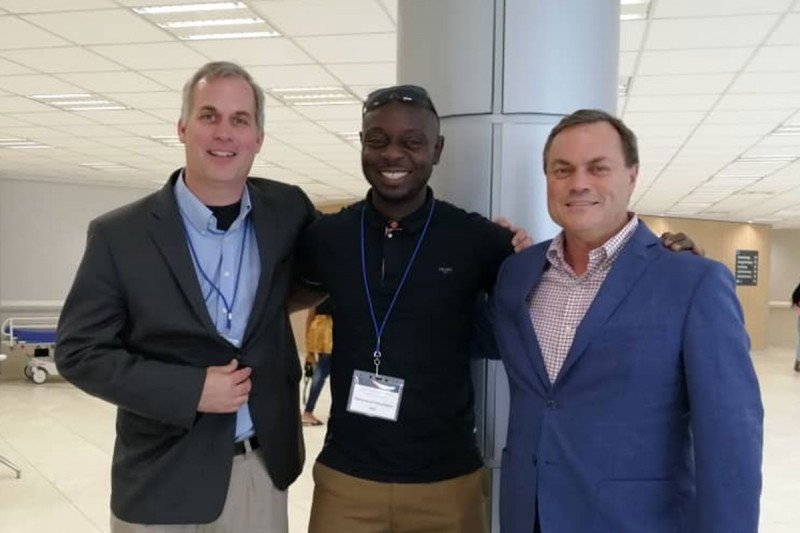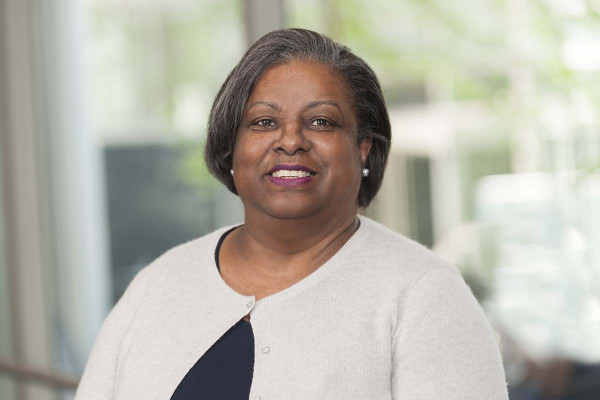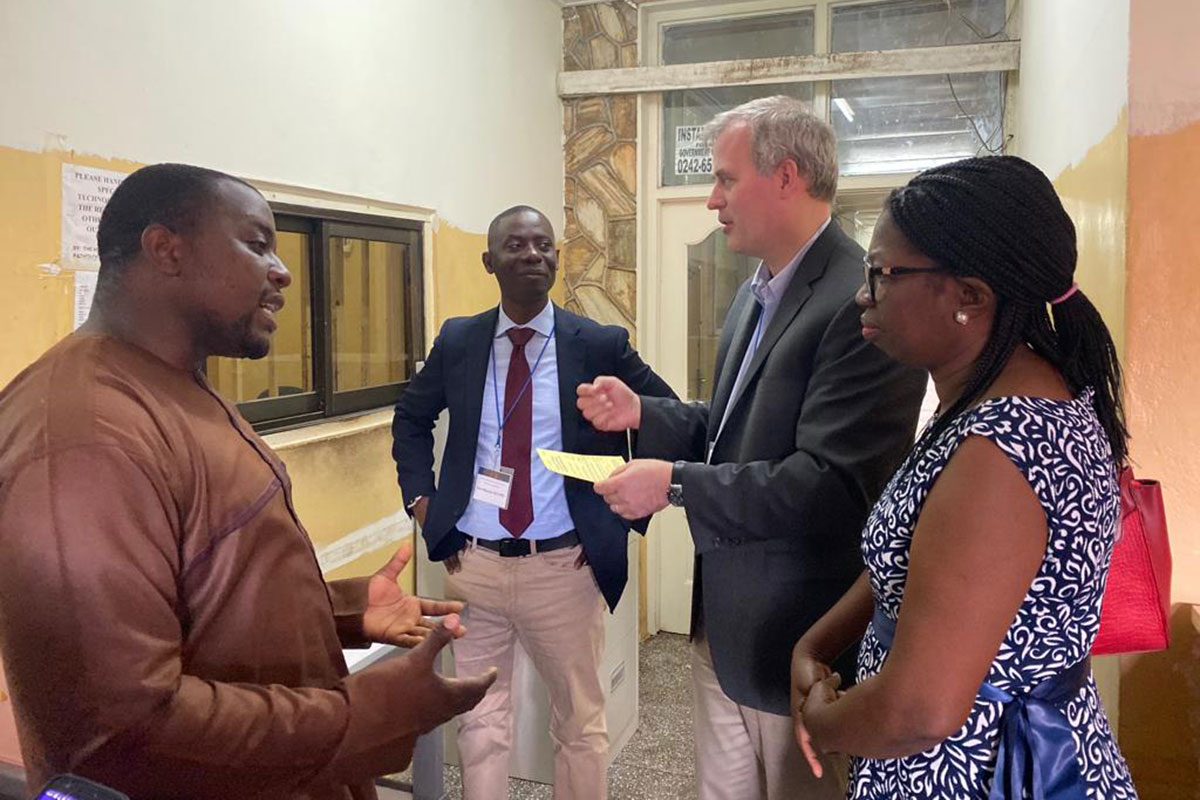
Cancer doesn’t discriminate. Few people are more keenly aware of this fact than Memorial Sloan Kettering pediatric hematologic oncologist Tanya Trippett, who is working to improve cancer diagnoses and outcomes in Ghana. In October, she founded the Cancer Genome Project Ghana partnership, which is a collaboration between Ghanaian medical research institutes and MSK’s Pathology and Pediatrics departments.
“Our intent is to bridge the disparities so that access to treatment, more knowledge, and better outcomes will be there for patients in Ghana,” says Dr. Trippett.

For the first time ever, leading researchers and doctors specializing in infectious disease, pathology, cancer, and pediatrics — from MSK and around the world — gathered in Ghana to exchange ideas and technology. The event, called the Cancer Genomic Research and Training Conference: Scaling Up Cancer Research in Ghana, was held from October 14 to 18, 2019, in Ghana’s capital, Accra.
The conference was co-led by Dr. Trippett and Ben Gyan, Associate Professor and Head of the Immunology Department at the Noguchi Memorial Institute for Medical Research at the University of Ghana.
Cancer Incidence in Ghana
According to a World Health Organization (WHO) report, in 2018 Ghana had a population of 29 million people with 22,823 new diagnoses of cancer and approximately 15,000 cancer-related deaths. The highest number of deaths were related to cervical, ovarian, and breast cancers, followed by prostate, liver, colorectal, and stomach cancers, and non-Hodgkin lymphoma.
Despite the country’s prevalence of cancer, members of the Cancer Genome Project Ghana say that cancer research and treatment lag behind research and treatment related to infectious diseases. There is also a need for more accurate documentation of cancer-related incidence and deaths in the country.
“In Ghana, genomic research is strong in infectious diseases, such as malaria and tuberculosis,” says physician-scientist Michael Roehrl, Director of MSK’s Precision Pathology Biobanking Center and a partnership member. “But cancer care in Africa overall has been lacking while the incidence of cancer is growing,” he adds.
“Ghana is no longer considered a developing country, but it will still benefit greatly from partnerships such as the Cancer Genome Project Ghana” to improve cancer care and research, says Nana Yaa Mensah, a technologist and quality-control lead in Molecular Diagnostic Pathology at MSK and a member of the partnership. “This initiative is a collaborative effort to find out what Ghana’s research institutes need and how we can help them reach their goals for cancer care.”
Cancer Genome Project Ghana Partnership
Dr. Trippett’s first introduction to Ghana was in the summer of 2017, when she visited the country to help establish the International Children’s Cancer Research Centre.
“The outcomes for childhood cancer are so poor in emerging nations like Ghana,” says Dr. Trippett, adding that the average cure rate for children with cancer is only 20 to 30 percent, compared to 85 percent in the United States.
She wanted to establish a stronger connection between MSK and her newfound partners in Ghana. MSK doctors and researchers have a strong understanding of the genetic mutations that drive cancer growth. “I wanted to mirror the capacity that we provide at MSK,” she says. So, she brought together researchers and experts from MSK and the Noguchi Memorial Institute for Medical Research, Ghana’s leading biomedical research institute, which until recently focused primarily on genomic analyses of diseases such as malaria, HIV, yellow fever, and West Nile virus.
MSK in Ghana
During the conference in October, Dr. Trippett and her MSK colleagues met with international scientists as well as Ghanaian doctors and researchers. Through training and hospital visits, MSK staff shared the latest knowledge about noncommunicable diseases (illnesses not transmitted person-to-person) and introduced innovative cancer diagnosis, treatment, and research tools.

They also learned more about some of the greatest needs and challenges faced by Ghanaian healthcare institutes, particularly delays in making accurate cancer diagnoses. Because of staff, funding, and limited resources, getting reagents (chemicals needed to analyze tumor and blood samples) or diagnostic results can take up to six months or more. Equipment that is shipped internationally can be held up in customs while authorization is pending.
Healthcare centers also need better tools; more reliable infrastructures for hospital laboratories, such as disruption-free electricity and water supplies; information technology support; and more hands-on training for physicians specializing in pathology.
“There is a lot of truth to the famous quote from Sir William Osler, a Canadian physician and one of the founding professors of Johns Hopkins Hospital: ‘As is your pathology, so is your medicine,’” says Dr. Roehrl. “It makes it hard to provide effective cancer care when so many patients in Ghana don’t even have an accurate pathological diagnosis. We will carefully look at the Ghanaian healthcare infrastructure and see where we can help.”
“By 2030, 80 percent of the cancer burden will be in developing countries, and the number of cancer cases in sub-Saharan Africa is increasing at an alarming rate,” says Peter Ntiamoah, Manager of Surgical Pathology at MSK and a member of the Cancer Genome Project Ghana. “This is the time for us to do something.”
Giving Back to One’s Home Country
For Dr. Ntiamoah, bringing his expertise to his home country of Ghana holds a special place in his heart. “MSK is a renowned cancer center, so bringing knowledge I’ve acquired here to the country where I was born is incredibly fulfilling,” he says. “Teaming up with institutions in Ghana can help further leverage what MSK has already done to help them get on their feet.”
Ms. Mensah echoes Dr. Ntiamoah’s sentiments. “As the daughter of Ghanaian immigrants, working at MSK in Diagnostic Molecular Pathology has been a tremendous opportunity to help others, and I am excited to be a part of MSK’s wonderful initiative to extend quality cancer care to Ghana and beyond,” she says. “Dr. Trippett and the members of the Cancer Genome Project Ghana partnership are creating a lasting and positive impact on the lives of people in the region.”
“Dr. Trippett has been a game changer for this,” Dr. Roehrl concurs. “I’m delighted and humbled to be part of this project.”


